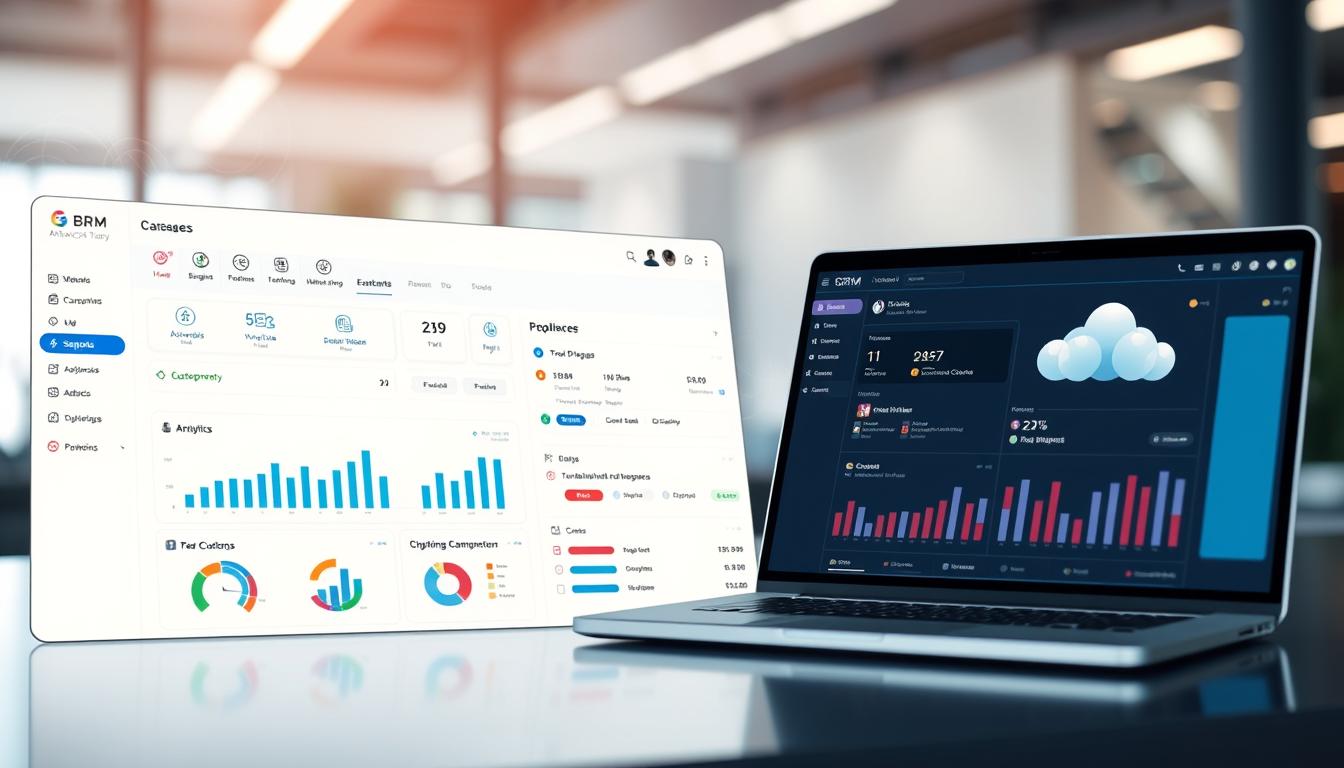Did you know that businesses that use good CRM strategies can see a big jump in revenue? Some have even seen a 27% increase.
We know that keeping leads and clients is key for growth. And B2B CRM software is a big help in this area.
Using CRM for businesses makes customers happier. It also makes our sales smoother. And all this leads to success in business.
Key Takeaways
- Good CRM strategies lead to more money and growth.
- B2B CRM software helps keep leads and clients.
- CRM for businesses makes customers happier.
- Smarter sales processes lead to success.
- Using CRM can really boost your revenue.
Understanding B2B Customer Relationship Management
The world of B2B customer interactions is complex. It needs a smart relationship management strategy. CRM is more than a tool; it’s a way to manage sales, marketing, and customer service.
What is CRM in B2B?
CRM in B2B means using practices, strategies, and technologies to manage customer interactions. It’s about knowing what your business clients need and offering services that meet those needs. By using CRM solutions for B2B, companies can make their sales processes better, improve customer satisfaction, and grow their business.
B2B CRM helps businesses manage complex interactions with other businesses. It improves communication and ensures consistent customer engagement. It’s key for any business wanting to get better at B2B client management.
Importance of CRM in Business
CRM is very important for businesses. It helps improve customer retention by offering personalized experiences and timely support. With the right CRM system, businesses can understand customer behavior, preferences, and needs better.
CRM systems also help businesses stay competitive. They provide the tools needed to quickly adapt to market changes and customer demands. By using a strong CRM strategy, businesses can improve customer experience, leading to more loyalty and growth.
Effective CRM also means using customer retention tools to keep a strong bond with clients. This way, businesses can build a loyal customer base. This is key for success in the competitive B2B world.
Benefits of B2B Customer Relationship Management
Using B2B CRM helps businesses keep customers and talk to them better. This is done by making customer interactions more personal and quick to respond to.
Improved Customer Retention
Building strong B2B relationships makes customers stick around longer. This leads to more business growth. Effective CRM systems let businesses keep track of what customers like and say.
This way, businesses can talk to customers in a way that matters. For example, CRM can spot customers who might leave and help bring them back. This makes customers happier and less likely to leave.
Enhanced Communication
B2B CRM also makes talking to customers better. It keeps all customer info in one place. This makes sure everyone in the company is on the same page.
Also, personalized communication from CRM insights makes customers more engaged. When messages and offers match what customers want, they have a bigger impact.
Key Features of a Successful B2B CRM System
A good B2B CRM system has key features that boost customer interaction and sales. These are vital for companies aiming to better manage their customer relationships.
Contact Management
Contact management is a core part of any CRM. It lets businesses keep all customer info in one place. This makes it simple to find and update customer details.
Good contact management helps businesses tailor their interactions with customers. This leads to happier customers.
With a strong contact management system, teams can see all customer interactions and history. This gives a full picture of each customer. It’s super helpful for sales, marketing, and customer service.
Sales Automation
Sales automation is key for making sales work better. It cuts down on manual work, freeing up time for more important tasks. Sales teams can then focus on building strong relationships and closing deals.
Automation also helps with lead scoring, nurturing, and managing pipelines. This ensures the right message reaches the right customer at the right time. It makes the sales process faster and better for the customer.
Analytics and Reporting
Analytics and reporting are crucial for smart decisions. A top CRM system offers deep insights into customer behavior and sales performance. It gives detailed reports and analytics.
These insights help businesses spot trends and opportunities. They can then tweak their strategies. Using data analytics, companies can make their CRM systems work better and engage customers more.
In summary, a top B2B CRM system needs strong contact management, sales automation, and analytics. By combining these, businesses can greatly improve their customer management. This leads to growth and happier customers.
Choosing the Right B2B CRM Software
Finding the right B2B CRM software can change how you manage customer relationships. With so many B2B customer interactions, picking a CRM that fits your business is key.
Factors to Consider
When picking a B2B CRM software, think about a few things. User-friendliness is important; it should be easy for everyone to use. Customization options are also crucial, letting you adjust the CRM to fit your needs.
Scalability is another big factor. Your CRM should grow with your business, handling more data and users smoothly.
Top CRM Solutions in the Market
There are many great CRM solutions out there. HubSpot CRM is known for its wide range of features and easy integration. Salesforce is a big name, offering lots of CRM tools for different business needs.
Zoho CRM is affordable and customizable, while Pipedrive specializes in sales pipeline management.
Choosing the right CRM is all about knowing what your business needs. “A CRM system is only as good as the data it’s built on and the insights it can provide,” CRM experts say.
- Assess your business needs before selecting a CRM.
- Consider the scalability and customization options.
- Evaluate the user-friendliness of the CRM interface.
Implementing B2B CRM Strategies
Setting up a B2B CRM strategy is key to better customer relationships and smoother business processes. The success of B2B CRM depends on its implementation and training teams. We will look at the steps to implement a CRM strategy and why training is crucial.
Step-by-Step Implementation Guide
To set up a B2B CRM system well, follow these steps:
- Define your CRM goals and objectives, aligning them with your business strategy.
- Choose a CRM solution that fits your business needs, considering factors like scalability and integration.
- Customize the CRM system to match your business processes, ensuring it meets your specific requirements.
- Develop a data migration plan to transfer existing customer data to the new CRM system.
- Provide comprehensive training to your team, ensuring they understand how to use the CRM effectively.
By following these steps, businesses can ensure a smooth transition to a new CRM system and maximize its benefits.
Training Your Team
Training is a key part of CRM implementation. It’s not just about using the software; it’s about using it to improve customer interactions and business outcomes. Good training should cover:
| Training Aspect | Description | Benefits |
|---|---|---|
| CRM Basics | Understanding the CRM interface, navigation, and core features. | Enhanced user adoption and reduced support queries. |
| Data Management | Learning how to input, manage, and analyze customer data. | Improved data accuracy and better decision-making. |
| Sales and Marketing Alignment | Understanding how to use CRM data to align sales and marketing efforts. | Increased sales productivity and more targeted marketing campaigns. |
CRM experts say, “Proper training is the backbone of successful CRM implementation. It empowers teams to use the system effectively, leading to improved customer relationships and business performance.”
“The right CRM system, coupled with comprehensive training, can transform your business by enhancing customer interactions and streamlining processes.”
By focusing on both the implementation guide and team training, businesses can ensure they get the most out of their CRM investment. This leads to better customer satisfaction and business growth.
Data Management in B2B CRM
Managing data well is crucial for getting the most out of B2B CRM. Businesses need good data to make smart choices. This is why quality data is so important.
Importance of Quality Data
Quality data is the base of a strong B2B CRM strategy. It helps us know our customers better and send them the right messages. This way, we can keep our customers happy and loyal, thanks to effective CRM for businesses.
Accurate data cuts down on mistakes and makes our CRM systems work better. It makes sure our talks with customers are personal and meaningful. This leads to happier customers.

Data Security Considerations
With more data, keeping it safe is a big deal. We need strong security to keep our customer data safe from hackers and leaks.
Some key things to think about for data security are:
- Using encryption to keep data safe when it’s moving or stored.
- Doing regular security checks to find weak spots.
- Teaching staff how to handle and protect data properly.
| Data Security Measure | Description | Benefit |
|---|---|---|
| Encryption | Protects data from unauthorized access. | Enhances data security. |
| Regular Security Audits | Identifies vulnerabilities in the system. | Reduces risk of data breaches. |
| Staff Training | Educates staff on data handling best practices. | Minimizes human error. |
By focusing on quality data and strong security, our B2B CRM systems will be effective, safe, and reliable.
Personalizing Customer Interactions
Making interactions fit each customer’s needs is key in B2B customer management. It boosts the customer experience, leading to more engagement and loyalty.
Tailoring Communication
Effective personalization means tailoring communication to meet each customer’s specific needs. This is done with customer experience software that tracks interactions and preferences. Businesses use this data to craft messages that really speak to their customers.
For example, using a customer’s name or referencing past interactions makes communication feel more personal. A CRM expert says, “Personalization is more than just using a customer’s name. It’s about understanding their needs and delivering value.”
“The future of marketing is personal. It’s about creating experiences that are tailored to the individual customer.”
Utilizing Customer Insights
Using customer insights is vital for personalizing interactions. By analyzing data, businesses learn about customers’ needs, preferences, and behaviors. This knowledge helps shape personalized marketing, improve service, and enhance the overall experience.
Customer insights can reveal patterns, like frequent purchases or interest in certain products. This info guides targeted promotions or recommendations that customers are more likely to appreciate.
By mixing tailored communication with customer insights, businesses can craft a strong personalization strategy. This approach boosts engagement and loyalty. As we dive deeper into B2B client management, personalization’s role in shaping customer experiences will grow even more.
Measuring the Success of Your CRM
To make sure our CRM systems are top-notch, we need to check their performance often. It’s key to see how well our CRM plans work for managing customer interactions and growing our business.
When we use CRM solutions for B2B, picking the right metrics is crucial. That’s where Key Performance Indicators (KPIs) play a big role.
Key Performance Indicators (KPIs)
KPIs give us a clear view of how our CRM affects our business. Important KPIs to watch include:
- Customer retention rates
- Sales growth
- Customer satisfaction scores
- Lead conversion rates
By keeping an eye on these KPIs, we can learn a lot about our CRM’s success. This helps us make smart choices to better our strategies.

Feedback Collection
It’s also important to gather feedback from our customers. As Bill Gates said,
“Your most unhappy customers are your greatest source of learning.”
By listening to our customers and using their feedback, we can spot areas to get better. This way, we can make real changes.
To get feedback well, we can use surveys, focus groups, or direct talks. The goal is to have a feedback loop that lets us act on what we learn. This shows our customers we value their opinions.
By tracking KPIs and gathering feedback, we can make sure our CRM plans meet our customers’ needs. This leads to lasting success.
Integrating CRM with Other Business Tools
Integrating CRM with other business tools boosts efficiency. It connects CRM systems with marketing tools and team software. This streamlines processes, improves collaboration, and drives growth.
Seamless Integration with Marketing Tools
CRM and marketing tools integration offers a unified customer engagement approach. It tracks customer interactions across channels, giving a full view of their behavior and preferences.
Benefits of CRM and Marketing Tool Integration:
- Enhanced customer profiling
- Improved campaign tracking and analysis
- Streamlined lead management
For example, CRM and email marketing tool integration automates email campaigns. It uses customer data from CRM for personalized and targeted marketing. This boosts engagement rates.
| Integration Feature | Description | Benefit |
|---|---|---|
| Email Marketing Automation | Automates email campaigns based on CRM data | Personalized marketing, increased engagement |
| Lead Scoring | Assigns scores to leads based on interactions | Prioritized follow-up, improved conversion rates |
| Campaign Tracking | Monitors the performance of marketing campaigns | Data-driven decision making, optimized marketing strategies |
Enhancing Collaboration with Team Software
CRM integration with team software boosts internal communication and workflow. It ensures all teams access the same customer data. This reduces silos and improves response times.
For instance, CRM and project management tool integration tracks customer-related projects. It keeps all stakeholders informed and aligned.
The key to successful CRM integration is choosing the right tools that align with your business needs. Ensure they are compatible with your existing CRM system.
Overcoming Challenges in B2B CRM
The path to successful B2B CRM implementation is filled with hurdles. Businesses aim to use CRM systems to better serve customers and keep them coming back. Yet, they often face many obstacles.
Common Obstacles in Adoption
One big challenge is integrating CRM with current systems. This can cause data problems and operational inefficiencies. Also, some employees may resist new technology, making CRM adoption tough.
Other common hurdles include:
- Lack of adequate training for employees
- Insufficient data quality and management
- Inability to customize CRM to meet specific business needs
Solutions for Effective Usage
To beat these challenges, businesses need a smart plan for CRM use. This means training employees well and making sure the CRM fits the business’s needs.
Effective strategies for CRM adoption include:
| Strategy | Description | Benefits |
|---|---|---|
| Comprehensive Training | Providing employees with thorough training on CRM usage | Increased adoption rates, improved data quality |
| Customization | Tailoring CRM to meet specific business needs | Enhanced user experience, improved efficiency |
| Data Management | Ensuring high-quality data through regular audits and updates | Improved decision-making, better customer insights |
By tackling the common CRM adoption challenges and using smart solutions, businesses can get the most out of their CRM systems. This leads to better customer retention and overall business success.
As we face the complexities of B2B CRM, it’s crucial to tackle challenges directly. The right strategies for CRM use are key to success.
Future Trends in B2B Customer Relationship Management
The world of B2B Customer Relationship Management is changing fast. New technologies are making customer interactions better and helping businesses succeed.
Revolutionizing CRM with AI and Automation
AI and automation are changing B2B CRM. They make routine tasks easier, so businesses can focus on personalizing experiences. This is thanks to customer experience software.
Elevating Customer Experience
Customer experience is key in B2B CRM now. Businesses want to give experiences that fit each customer’s needs. They use B2B CRM software to understand and connect with customers better.
These trends will lead to better customer retention, sales, and growth. By keeping up with B2B CRM advancements, businesses can achieve lasting success.



